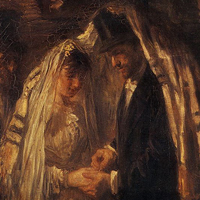What is Jewish Conservatism?
Applications are now closed.
Instructors: Eric Cohen, Meir Soloveichik, William Kristol, and Moshe Koppel
Stipend: $1,000 (NY area residents); $2,000 (Domestic U.S. and Canada); $3,000 (International)

At this moment in history, the Jewish people face great challenges. In the Middle East, the State of Israel sits at the crossroads of Iranian expansionism, Palestinian rejectionism, and regional civil war. European Jews look on, with uncertainty and foreboding, at the rise of a new and violent anti-Semitism. The vast majority of American Jews have only weak commitments to Jewish life, with high intermarriage rates, low Jewish birthrates, and declining commitment to Jewish causes. Meanwhile, modern secular culture seems ever more hostile to traditional religion—Judaism included—and radical Islam seems bolder and more extreme—especially in its zealous hostility to the Jewish people and the Jewish State.
In the political sphere, Jews have often put their faith in the varieties of modern liberalism to secure the rights, freedoms, and civic equality that all human beings should possess. And yet in crucial ways and in key moments, modern liberalism has not always served the Jews: the liberal faith in progress has been shaken by the vicious persistence of anti-Jewish politics; the liberal invitation to move beyond particular national identities and traditional pieties has weakened Jewish continuity; and the new liberal morality has actively sought to delegitimize traditional moral ideals, including the Jewish idea of the family and Jewish belief in the sanctity of life.
In Israel, the restoration of Jewish sovereignty—one of the great triumphs in Jewish history—has also presented new political and moral questions for the Jewish people. The Zionist project has been fueled by a variety of often conflicting ideologies—from socialism to religious messianism to liberal nationalism to post-Zionism—which regularly clash with each other. The place of Jewish law and rabbinic authority remains a flashpoint in modern Israel, and the political system is highly factionalized, except in moments of great crisis when the nation rallies to its own heroic self-defense.
Faced with the novel perils of the current era, has the time come for a reconsideration of Jewish politics? What aspects of liberalism should be supported and strengthened, and in what ways is modern liberalism in real tension with Jewish values and Jewish interests? Which political philosophy truly reflects Jewish ideals and aspirations, and which set of political commitments would best protect religious observance and preserve religious freedom, reassert the morality of self-defense, embrace the traditional Jewish family, recognize the dignity of Jewish nationalism, and encourage free enterprise? In short, what would a conservative vision of Jewish politics look like, and how would it balance the Jewish tradition with the contemporary needs of the Jewish people and the Jewish State?
Building off of his recent essay in Mosaic, join Tikvah Fund executive director Eric Cohen, theologian Rabbi Meir Soloveichik, and policy analysts William Kristol and Moshe Koppel, as we seek the political wisdom to meet the enduring human problems and pressing policy challenges of Jewish life in the United States, Europe, and the State of Israel.
A note to our alumni: In the interest of bringing more new faces into the Tikvah community, we are not taking applications this round from past participants in Tikvah programs. We have a limited number of auditor seats in the programs that we are always thrilled to give to alumni of past programs. If you are interested in attending a program as an auditor please write to info@tikvahfund.org.
